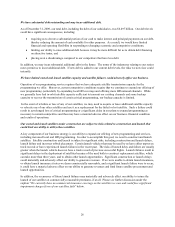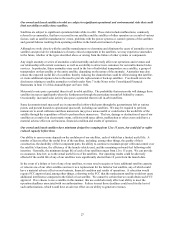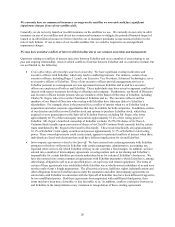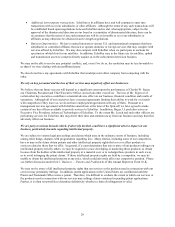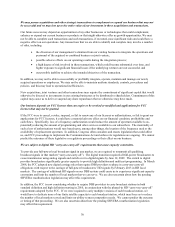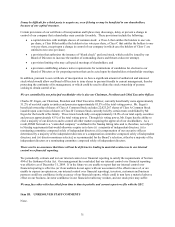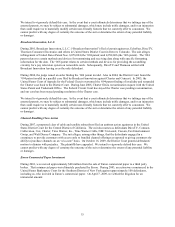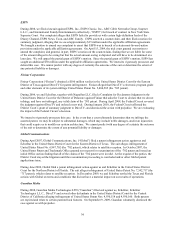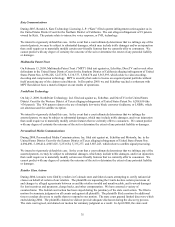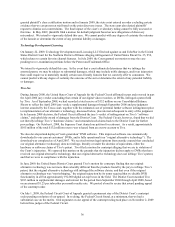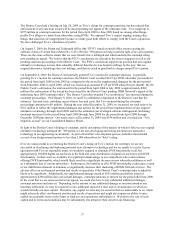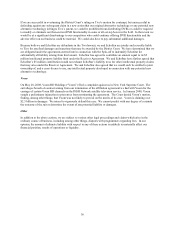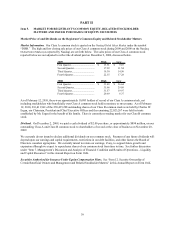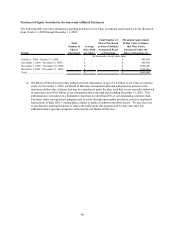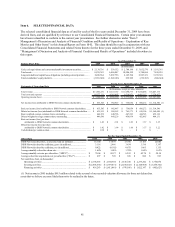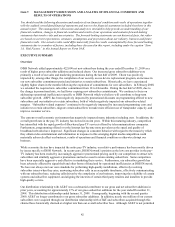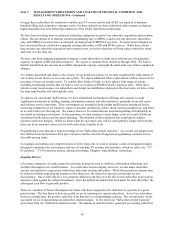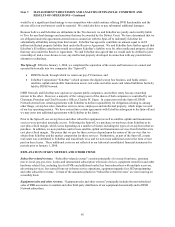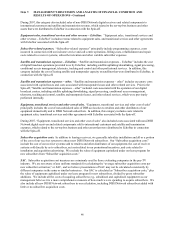Dish Network 2009 Annual Report Download - page 46
Download and view the complete annual report
Please find page 46 of the 2009 Dish Network annual report below. You can navigate through the pages in the report by either clicking on the pages listed below, or by using the keyword search tool below to find specific information within the annual report. 36
granted plaintiff’s class certification motion and in January 2009, the state court entered an order excluding certain
evidence that we can present at trial based on the prior discovery issues. The state court also denied plaintiffs’
request to dismiss our counterclaims. The final impact of the court’s evidentiary ruling cannot be fully assessed at
this time. In May 2009, plaintiffs filed a motion for default judgment based on new allegations of discovery
misconduct. We intend to vigorously defend this case. We cannot predict with any degree of certainty the outcome
of the lawsuit or determine the extent of any potential liability or damages.
Technology Development Licensing
On January 22, 2009, Technology Development and Licensing LLC filed suit against us and EchoStar in the United
States District Court for the Northern District of Illinois alleging infringement of United States Patent No. 35, 952,
which relates to certain favorite channel features. In July 2009, the Court granted our motion to stay the case
pending two re-examination petitions before the Patent and Trademark Office.
We intend to vigorously defend this case. In the event that a court ultimately determines that we infringe the
asserted patent, we may be subject to substantial damages, which may include treble damages, and/or an injunction
that could require us to materially modify certain user-friendly features that we currently offer to consumers. We
cannot predict with any degree of certainty the outcome of the suit or determine the extent of any potential liability
or damages.
Tivo Inc.
During January 2008, the United States Court of Appeals for the Federal Circuit affirmed in part and reversed in part
the April 2006 jury verdict concluding that certain of our digital video recorders, or DVRs, infringed a patent held
by Tivo. As of September 2008, we had recorded a total reserve of $132 million on our Consolidated Balance
Sheets to reflect the April 2006 jury verdict, supplemental damages through September 2006 and pre-judgment
interest awarded by the Texas court, together with the estimated cost of potential further software infringement prior
to implementation of our alternative technology, discussed below, plus interest subsequent to entry of the judgment.
In its January 2008 decision, the Federal Circuit affirmed the jury’s verdict of infringement on Tivo’s “software
claims,” and upheld the award of damages from the District Court. The Federal Circuit, however, found that we did
not literally infringe Tivo’s “hardware claims,” and remanded such claims back to the District Court for further
proceedings. On October 6, 2008, the Supreme Court denied our petition for certiorari. As a result, approximately
$105 million of the total $132 million reserve was released from an escrow account to Tivo.
We also developed and deployed “next-generation” DVR software. This improved software was automatically
downloaded to our current customers’ DVRs, and is fully operational (our “original alternative technology”). The
download was completed as of April 2007. We received written legal opinions from outside counsel that concluded
our original alternative technology does not infringe, literally or under the doctrine of equivalents, either the
hardware or software claims of Tivo’s patent. Tivo filed a motion for contempt alleging that we are in violation of
the Court’s injunction. We opposed this motion on the grounds that the injunction did not apply to DVRs that have
received our original alternative technology, that our original alternative technology does not infringe Tivo’s patent,
and that we were in compliance with the injunction.
In June 2009, the United States District Court granted Tivo’s motion for contempt, finding that our original
alternative technology was not more than colorably different than the products found by the jury to infringe Tivo’s
patent, that the original alternative technology still infringed the software claims, and that even if the original
alternative technology was “non-infringing,” the original injunction by its terms required that we disable DVR
functionality in all but approximately 192,000 digital set-top boxes in the field. The District Court awarded Tivo
$103 million in supplemental damages and interest for the period from September 2006 through April 2008, based
on an assumed $1.25 per subscriber per month royalty rate. We posted a bond to secure that award pending appeal
of the contempt order.
On July 1, 2009, the Federal Circuit Court of Appeals granted a permanent stay of the District Court’s contempt
order pending resolution of our appeal. In so doing, the Federal Circuit found, at a minimum, that we had a
substantial case on the merits. Oral argument on our appeal of the contempt ruling took place on November 2, 2009
before three judges of the Federal Circuit.


